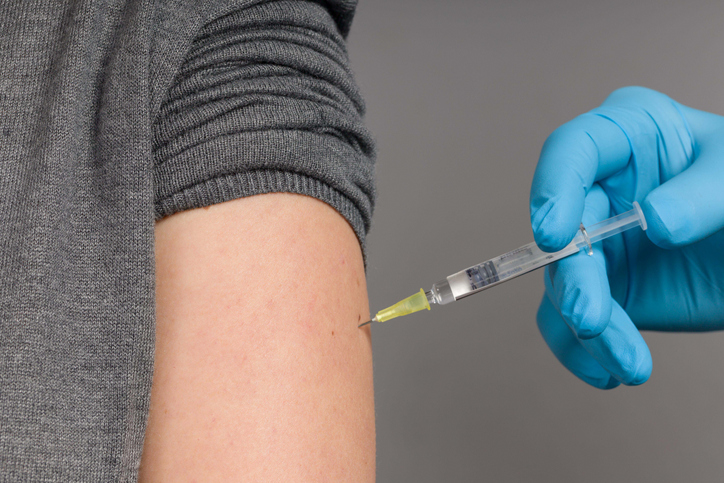A study in the journal Nature is raising alarms about just how much wasn’t known about the mRNA shots for COVID-19 before billions of people received them.
The study, titled “N1-methylpseudouridylation of mRNA causes +1 ribosomal frameshifting,” was published on December 5 and had 20 authors, led by researchers at Cambridge University’s Medical Research Center (MRC).
“(T)he MRC Toxicology Unit team tested for evidence of the production of ‘off-target’ proteins in people who received the mRNA Pfizer vaccine against COVID-19,” states the press release on the university’s website. “They found an unintended immune response occurred in one third of the 21 patients in the study who were vaccinated—but with no ill-effects…. The team then redesigned mRNA sequences to avoid these ‘off-target’ effects, by correcting the error-prone genetic sequences in the synthetic mRNA. This produced the intended protein.”
At issue is a phenomenon called +1 ribosomal frameshifting. Proteins are translated by reading trinucleotides, known as codons, on the mRNA strand. The amino acid methionine acts as a “start” codon, specifying where a sequence begins. Codons occur in groups of three. A shift of any number of nucleotides not divisible by three in the reading frame will cause subsequent codons to be misread, changing the ribosomal reading frame. Such changes create very different amino acid sequences.
The authors of the study say the COVID-19 vaccines are safe, but other experts claim the risks of using the mRNA technology are self-evident.
‘Safer Going Forward’
Anne Willis, director of the MRC Toxicology Unit and joint senior author of the report, told reporters the ability to fix the problem of frameshifting will make new mRNA medicines safer.
“This technology is amazing and it’s going to be revolutionary as a new medicine platform for all sorts of things, but we’ve just made it a whole lot safer going forward,” said Willis, according to the Telegraph. “(Willis) adds it is very exciting that there is a way to fix the issue, which ‘massively de-risks this platform going forward.’”
The idea of massively de-risking something would seem to indicate dangers are present, noted Jeff Childers, attorney, and author of the Covid and Coffee substack, on December 7.
“Here’s the simple version: the researchers discovered that a necessary ingredient in the mRNA vaccines (1-methylpseudouridine) has an unfortunate side-effect: it messes up RNA translation one-third of the time by slipping a gear every so often,” wrote Childers. “Instead of making the intended spike protein, these tiny mistranslational slip-ups create … other things. Other kinds of proteins. New ones. And there’s no way at all to predict what kind of protein it will create. It’s stochastic (completely random).”
Childers notes, “The ‘vaccine’ creates stochastic proteins one third of the time. In one-third of cells, not people, like the Telegraph again mis-reported. There are trillions of mRNA packages in each shot. So—unless I’m missing something—what the study is saying, without actually saying it, is that this is happening inside every single jab recipient. And it’s happening a lot.”
Not A Problem?
There is “no evidence” the modified mRNA in COVID-19 vaccines is unsafe, says Joel M. Zinberg, M.D., J.D., senior fellow with the Competitive Enterprise Institute and director of the Public Health and American Well-Being Initiative at Paragon Health Institute.
“Ribosomes sometimes translate mRNA incorrectly—ribosome frameshifting is a well-documented phenomenon that occurs during translation of many naturally occurring mRNAs,” said Zinberg. “This results in making small amounts of unintended proteins. The Nature researchers document that the modified ribonucleotide in the COVID-19 vaccine results in production of a small amount of frame-shifted protein and that the body has an immune response to this protein. But there is no evidence this is harmful.”
The mRNA shots are designed to act like viruses in a way that triggers the immune system to make copies of the spike protein. The body responds to those proteins by making antibodies, which protect the body.
‘No Evidence’ v. ‘Unknown Effects’
Other researchers point to the difference between the lack of existing evidence and potential negative effects that have not been thoroughly explored. Jane M. Orient, M.D., executive director of the Association of American Physicians and Surgeons, says information indicating there are risks in the mRNA vaccines has been downplayed or suppressed.
“The clinical trials that were done showed an enormous number of adverse effects, even over a period of a couple months, which were not revealed,” said Orient. “Pfizer tried to conceal the documents (by deferring their release) for 75 years!
“Molecular biology, and the immune system, are incredibly complex. Non-specialists, including most physicians, have a very superficial understanding…. It is impossible to know long-term effects for years. Informed consent would have to include the fact that effects on fertility, cancer, and birth defects are unknown. And that there is the risk of blood clots, heart damage, and sudden death, ‘rare’ (but we don’t know how rare). The safety signals are strong enough that the vaccines should have been taken off the market until the role of the vaccine could have been determined.
“Our regulatory agencies are not doing their job. There are pervasive conflicts of interest and billions of dollars at stake.”
Scientists presumed the mRNA would be quickly destroyed and the shots would produce only spike protein, noted journalist Alex Berenson, who called the Nature study a “bombshell,” on his Unreported Truths substack, on December 11.
“Yep, mRNA shots are great,” wrote Berenson. “They’re ‘amazing’! And they’re not exactly unsafe. But soon they’ll be ‘a whole lot safer.’ How reassuring! Too bad over 1 billion people have already received them.”
Kevin Stone (kevin.s.stone@gmail.com) writes from Arlington, Texas.
